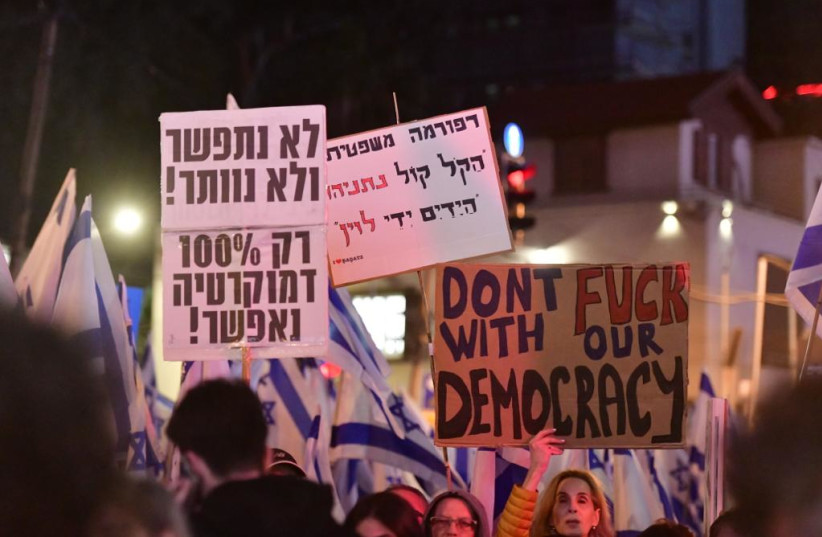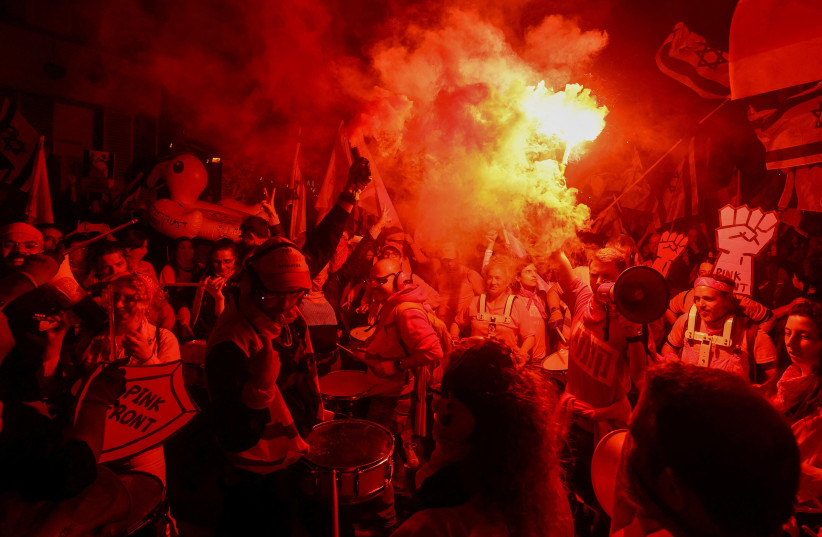Tens of thousands protest judicial reform for 13th consecutive week
Tens of thousands of judicial reform protesters took to the streets of Israel in over 150 locations on Saturday night, despite the pause in the judicial reform legislation process as the two sides conduct negotiations.
Protest organizers appealed to the police commissioner on Saturday night to hold an emergency meeting to discuss violence used against demonstrators that evening, according to Walla! Police were reportedly seen using devices dubbed “tzeakot” (literally, “screams”) which create a deafeningly loud sound next to protesters in Tel Aviv.
תיעוד: פרש משטרתי מכה מפגינה באיילון. 19 חשודים נעצרו@milleryuval_ pic.twitter.com/zEsrmN3UIX
— גלצ (@GLZRadio) April 1, 2023
Protesters blocked the Karkur junction in northern Israel, with nearly 2,000 demonstrators arriving at the area to protest, Hebrew media reported.
In Tel Aviv, road closures were set up at 4:30 p.m. for the protests which began at 7:30 p.m., and police stated that officers will be stationed at the roadblocks to prevent cars passing through and that alternative routes should be used.
Police also arrested three young men, aged 19, who were carrying assault weapons and pepper spray to the demonstration in the city, Ynet reported. They were taken in for questioning. According to update from the police, a total of 19 people were arrested in Tel Aviv during the Saturday night protests.
 Protesters of the judicial reform at a demonstration in Tel Aviv on April 1, 2023. (credit: AVSHALOM SASSONI/MAARIV)
Protesters of the judicial reform at a demonstration in Tel Aviv on April 1, 2023. (credit: AVSHALOM SASSONI/MAARIV)On Highway 20, about twenty protesters descended on the road near Yitzhak Navon Bridge, where a police force dispersed them and the road was reopened to traffic.
“This is the most critical time since the founding of the state. Like in Poland, they took time to reorganize on the way to trampling on democracy.”
Protest organizers
Also attending the demonstration in Tel Aviv was the Director-General of the Prime Minister’s Office and former Netanyahu chief of staff Yoav Horowitz.
ספוטד בקפלן: מנכ”ל משרד רה”מ וראש הסגל של נתניהו לשעבר יואב הורוביץ pic.twitter.com/1DIiFjYOCD
— Tal Shalev (@talshalev1) April 1, 2023
In addition, large portions of Yigal Alon Street were blocked off, as well as Yitzhak Sadeh and Hashalom Street.
According to the Umbrella Movement of Resistance against Dictatorship in Israel, by 10 p.m., some 450,000 people had been in attendance at various protests across the country.
Protesters vow not to stop demonstrating
“Netanyahu’s attempt to put the protesters to sleep failed,” the organization said. “Over 445,000 pro-democracy demonstrators took to the streets of Israel tonight, in one of the largest demonstrations in Israeli history. We will continue to be in the streets until we guarantee that the State of Israel is a democracy.”
In Haifa, a protester who waved a Palestinian flag at a demonstration was arrested by police was arrested on suspicion of assaulting a police officer and disorderly conduct, Hebrew media reported. Also in Haifa, protesters that waved Palestinian flags were not allowed to reach the demonstration area after it was explained to them by the commander of the event that waving the flags there could disturb the peace.
In Netanya, about 200 demonstrators in favor of the judicial reform blocked Ben Gurion Boulevard. Hundreds of judicial reform supporters blocked Weitzmann street in Kfar Saba.
 People take part in a demonstration against Israeli Prime Minister Benjamin Netanyahu and his nationalist coalition government’s plan for judicial overhaul, in Tel Aviv, Israel April 1, 2023. (credit: REUTERS)
People take part in a demonstration against Israeli Prime Minister Benjamin Netanyahu and his nationalist coalition government’s plan for judicial overhaul, in Tel Aviv, Israel April 1, 2023. (credit: REUTERS)President Isaac Herzog, who has been mediating the negotiations, said on Friday that he was doing everything in his power to achieve a broad agreement, and expressed positivity about the progress.
“In the last few days, my team and I held a round of meetings with the representatives of the coalition and the opposition,” Herzog said. “The meetings were in a good spirit and we talked about the process of the talks for reaching agreements, the organization model, and the way of making decisions.”
While Herzog portrayed the results of the meetings in a positive light, on Saturday night coalition senior officials said that there was pessimism in the President’s Residence about the possibility of reaching a national agreement.
Coalition members accused the opposition of being uninterested in reaching an agreement on the Judicial Selection Committee, in response to National Unity members like MK Chili Tropper refusing to allow a framework in which any judges would be appointed by a simple coalition-led majority on the panel. The officials said that this position killed the talks.
Herzog on Friday said that he was aware of the suspicion, hostility and mistrust between the involved parties, but urged all to be open to the negotiations.
“It is important that we take a deep breath, face reality and give the negotiation process a real chance,” Herzog said.
Opposition Protest leaders expressed skepticism of the negotiations on Saturday night, continuing with the anti-judicial reform protests that had rocked the country since Justice Minister Yariv Leving announced the legal plan in early January.
“We are on guard,” Yesh Atid leader Yair Lapid wrote on Twitter, sharing photos of himself attending the protests. “The danger has not yet passed.”
Labor leader Merav Michaeli said at the demonstration at Tel Aviv’s Kaplan street that the protests would continue throughout the negotiations to assure that the opposition would not fall for “spin” by Netanyahu.
Dr. Eliad Shraga of the Movement for Quality Government said that as compromise proposals were made in the coming week at the President’s Residence, the protesters were making it clear to the coalition what their demands were, and that they would not negotiate with “criminals, anarchists and terrorists.”
“We will never compromise on our liberal democratic values,” Shraga said at an Ashdod protest on Saturday. “We will never give up on the structure of our government system, on the demand for strict and clear rules of the game for our system of regime, we will never blink, on our demand for the bill of human rights.”
Prime Minister Benjamin Netanyahu’s cousin and the son of the late Chief Justice Shoshana Netanyahu, Professor Nathan Netanyahu, is set to speak at the Tel Aviv protests, as is former media advisor to the prime minister, Yossi Levy.
Other speakers include Maj.-Gen. (ret) Amos Malka and Rina Eileen-Gorlik, CEO of the Ethiopian Jewish Association.
In Jerusalem, several areas were closed off to traffic starting in the early evening. These include Aza Street, where the Prime Minister’s residence is, and the areas around the President’s Residence on Jabotinsky Street.
Uri Banki, the father of Shira Banki, who was murdered during the Jerusalem Pride Parade in 2015, will be speaking during a demonstration outside President Isaac Herzog’s residence during the evening.
Ahead of the demonstrations, the protest organizers stated: “We are four weeks from the passing of the dictatorship laws. Anyone who read the statements from the Justice Minister and other officials this week understands that unfortunately they do not want to reach broad agreements, but only want to gain time and put the protests to sleep.
“This is the most critical time since the founding of the state. Like in Poland, they took time to reorganize on the way to trampling on democracy. The demonstrations tomorrow and in the coming weeks are critical for the future of the state. Go demonstrate,” they concluded.





Comments are closed.